community
Banking the Most Valuable Currency: Time
David Gill might be the richest man in Sebastopol, California. The semi-retired health care administrator is banking the most valuable currency in the world: time. Gill currently has 480 hours in his savings account at the local time bank, “and I haven’t even registered any of my hours in 2023,” he says.
In brief, a time bank does with time what other banks do with money: It stores and trades it. “Time banking means that for every hour you give to your community, you receive an hour credit,” explains Krista Wyatt, executive director of the DC-based nonprofit TimeBanks.Org, which helps volunteers establish local time banks all over the world. Nobody keeps track of the exact number, but thousands of time banks with several hundred thousand members have been established in at least 37 countries, including China, Malaysia, Japan, Senegal, Argentina, Brazil and in Europe, with over 3.2 million exchanges. There are probably more than 40,000 members in over 500 time banks in the US.
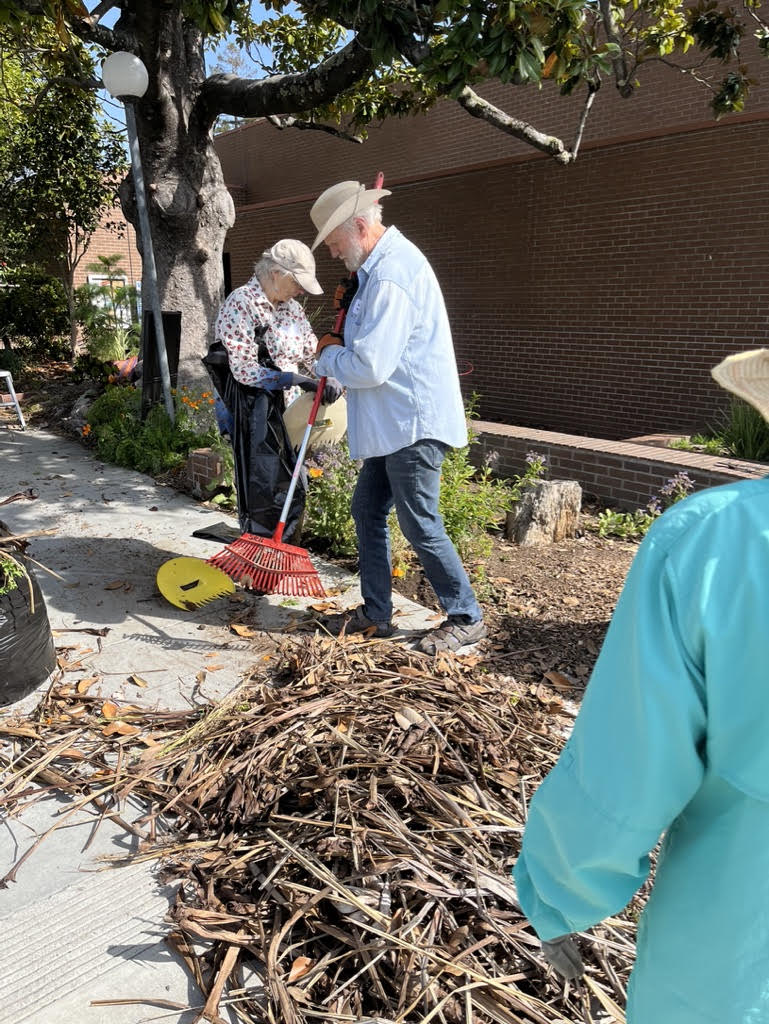 Steve Bursch (with red rake) and fellow time bankers beautify the library grounds for the City of Sebastopol. Credit: Marty Roberts / Sebastopol Area Time Bank
Steve Bursch (with red rake) and fellow time bankers beautify the library grounds for the City of Sebastopol. Credit: Marty Roberts / Sebastopol Area Time Bank
In Sebastopol, 250 residents have time bank accounts where they save and withdraw hours as needed. For instance, Gill, who is also the main local time bank coordinator, likes to offer his expertise with computer programming, editing and financial planning. In return, he asks for help when he needs a ride to the airport or someone to transport heavy furniture. He rattles off the first few of many examples: “Steve, who lives on the next block, drove me and my partner to the Santa Rosa airport. Ken fixed the icemaker in our refrigerator, and Elaine did some electrical work.”
If he had called professional repair and taxi services, the expense would have been significant. However, the interest, so to speak, goes beyond the value of a mere transaction. The time banks are building social capital. “I’ve made wonderful friends I wouldn’t have met otherwise and we now invite each other to our garden parties,” says Gill. “It’s about making community and being a part of the community. You can’t put a price on that stuff.”
David Gill came to the time bank like most of his neighbors. He doesn’t remember where he first heard about it a few years ago, but he immediately thought it was a great idea. He signed up, started using it, and when the founders asked for help, he stepped up. He gets paid in the currency he values most: hours.
Many time banks are volunteer community projects, but the one in Sebastopol is funded by the city and operates under the nonprofit status of the Community Cultural Center. After all, time is money. “Every volunteer hour is valued around $29,” Wyatt calculates. “Now think about the thousands of dollars a city saves when hundreds of citizens serve their community for free.” The Sebastopol time bank has banked more than 8,000 hours since its launch in 2016. Members might reimburse each other for costs — for instance, gas mileage or materials — but the service itself and the membership are always free.
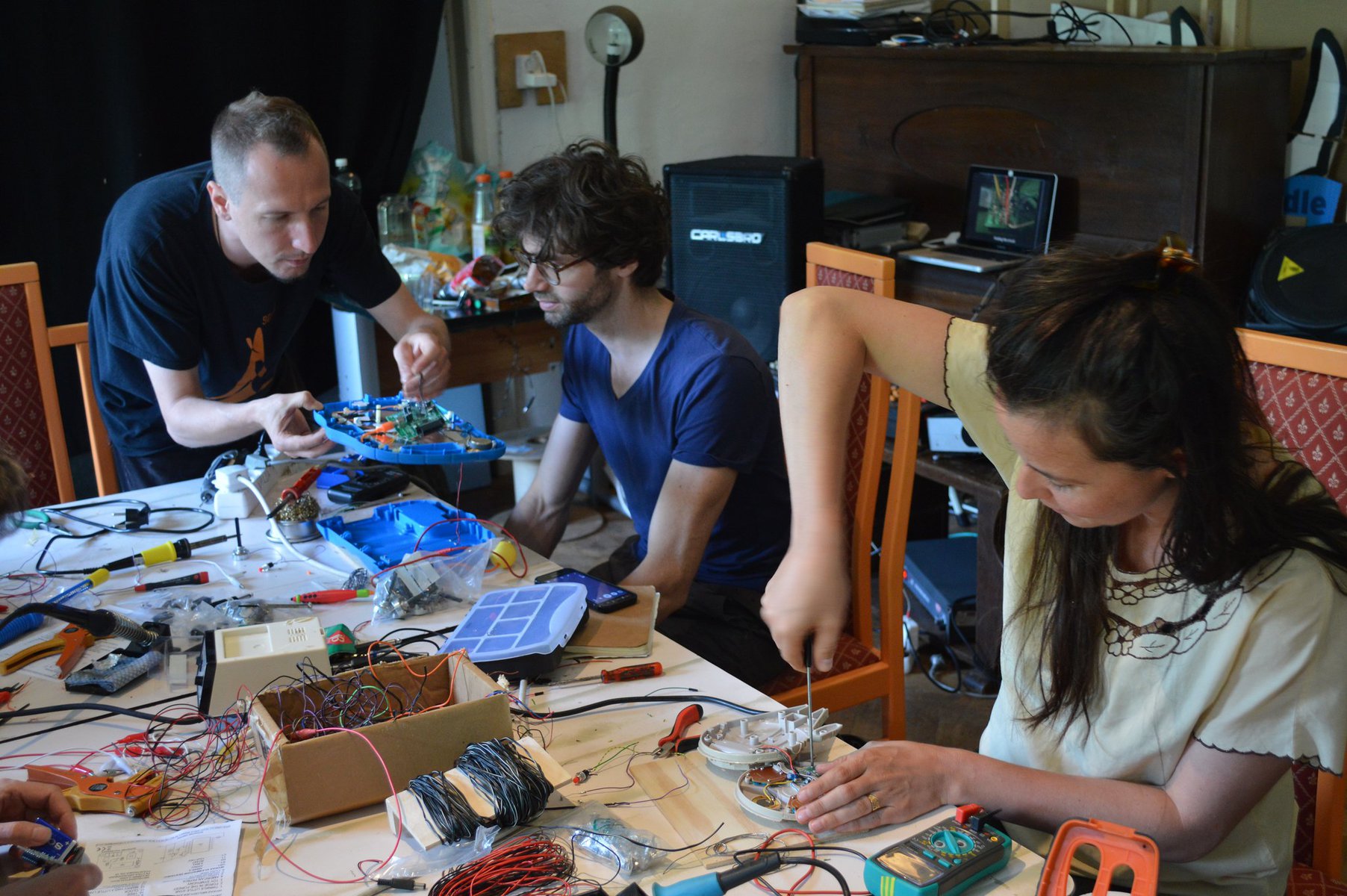 Time bank members in the Netherlands participate in a DIY electronics course. Credit: Timebank.cc
Time bank members in the Netherlands participate in a DIY electronics course. Credit: Timebank.cc
Some cities look to time banks as a model to support an aging population. In St. Gallen, Switzerland, only members over the age of 50 may join the local Stiftung Zeitvorsorge, or “Foundation Time Care,” which was founded in 2011 and has 320 members who have banked more than 80,000 hours. While Sebastopol’s time bank is more geared toward practical services to fill a gap other community services don’t address, members in St. Gallen regularly help seniors run errands, shop for groceries, take them to the doctor or simply keep them company. Here, too, the city guarantees the program, hoping that it will help seniors to stay in their homes and live independently longer because 75 percent of locals said in a poll that they hoped to stay in their homes as long as possible. Even if only five people were enabled to enter care homes a year later, the foundation’s executive director Jürg Weibel recently told the German magazine Der Spiegel, the investment would have already recouped itself. “The reality is that grown-up kids live in other areas,” Weibel said. “Also, many seniors are consciously looking for a new purpose.”
The time banks in both Sebastopol and St. Gallen have more offerings than demand. In a way, they have too much time in the bank, not least because seniors are looking to get help later in life.
Crushed by negative news?
Sign up for the Reasons to be Cheerful newsletter.
[contact-form-7]
“Seniors have a lot to offer,” Gill believes. While he points to his white hair as “pretty representative of the age of our time bank members,” some universities and schools have established time banks specifically for students and teachers at their institutions.
The idea of time as a bankable currency goes back to a Japanese seamstress and activist, Teruko Mizushima, who traded her sewing skills for fresh vegetables during the Pacific War in the early 1940s. In 1973, she started the first “Volunteer Labour Bank” that soon included thousands of members.
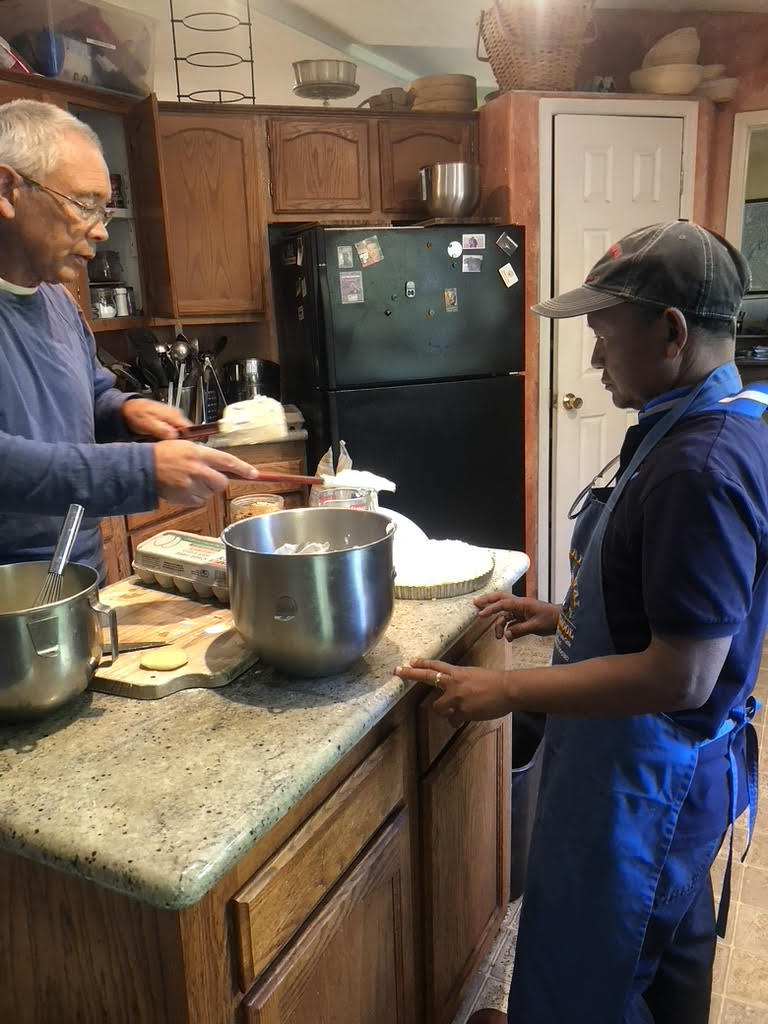 Tong Ginn (left) teaches Jesuda “Wee” Simla how to make croissants. Credit Michael D. Fels / Sebastopol Area Time Bank
Tong Ginn (left) teaches Jesuda “Wee” Simla how to make croissants. Credit Michael D. Fels / Sebastopol Area Time Bank
In the US, the civil rights lawyer Edgar Cahn, who worked as a speechwriter for Robert F. Kennedy and executive assistant to Peace Corps founder Sargent Shriver, rediscovered the idea of time banks as allies to fight poverty in the early 1960s, when money for social programs had dried up. He later coined the term “Time Dollars” and trademarked “Time Bank.” In 1995, he founded the nonprofit Krista Wyatt now works for as a hub of resources, first under the name “Time Dollar Institute.” “When he was bedridden in a hospital after a severe heart attack, he felt ‘useless,’ and saw time banks as a way for everyone to contribute to the community, no matter their age or qualifications,” Wyatt explains.
Cahn formulated five core principles that guide time banks to this day: First, everyone has something to contribute. Second, valuing volunteering as “work.” Third, reciprocity or a “pay-it-forward” ethos. Fourth, community building, and fifth, mutual accountability and respect.
“What captured me is that people are doing things out of their own good heart,” Wyatt says. “Many years ago, a woman got really upset because, as she said to Edgar Cahn, ‘I have nothing to give.’ Edgar Cahn listened and finally responded, ‘You have love to give.’ And the whole room just went silent.”
Every hour of service is valued the same, no matter how much skill and expertise a task takes, whether it’s an hour keeping someone company, helping them file their taxes or repair a roof. Through a simple online platform, every member can offer and request services and then register the hours they served or received. Especially during and since the Covid pandemic, the bank has also been an antidote to the epidemic of loneliness. For instance, the Sebastopol time bank regularly hosts in-person events and meetings.
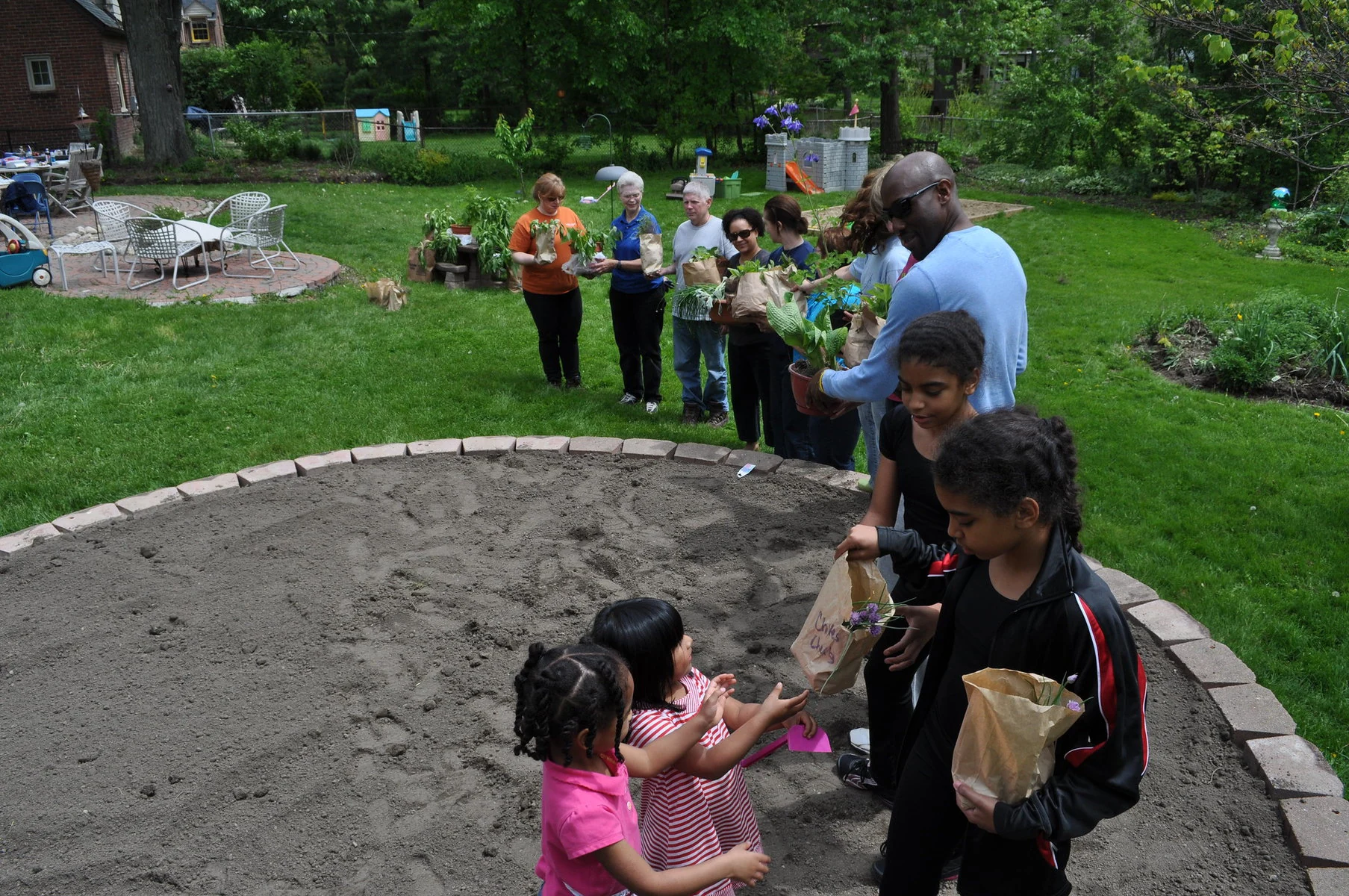 Lathrup Village, Michigan time bank members doing yard work together. Credit: Michigan Municipal League
Lathrup Village, Michigan time bank members doing yard work together. Credit: Michigan Municipal League
“We do events where everybody brings a list of five things they need to get done,” Wyatt gives an example. “You wouldn’t believe how many things get crossed off these lists in a room full of people who are willing to help.”
Wyatt came to TimeBanks after supporting cancer survivors. She’d read Cahn’s 2000 book, No More Throw-Away People, and was looking for a way to give back. “There are people like me who like to work on the computer rather than cleaning my garage,” Wyatt says, “and there are people who’d rather clean a garage than be stuck behind a computer. Everybody can be part of the time bank community. It’s as simple as that.”
In a way, time banks are the 2.0 version of what used to happen organically in small communities: Neighbors and colleagues would help each other out. “Now we simply do it with the help of a computer,” Gill says. “Or you may just pick up the phone and call another member directly rather than post a request online. It helps to get to know the various members.”
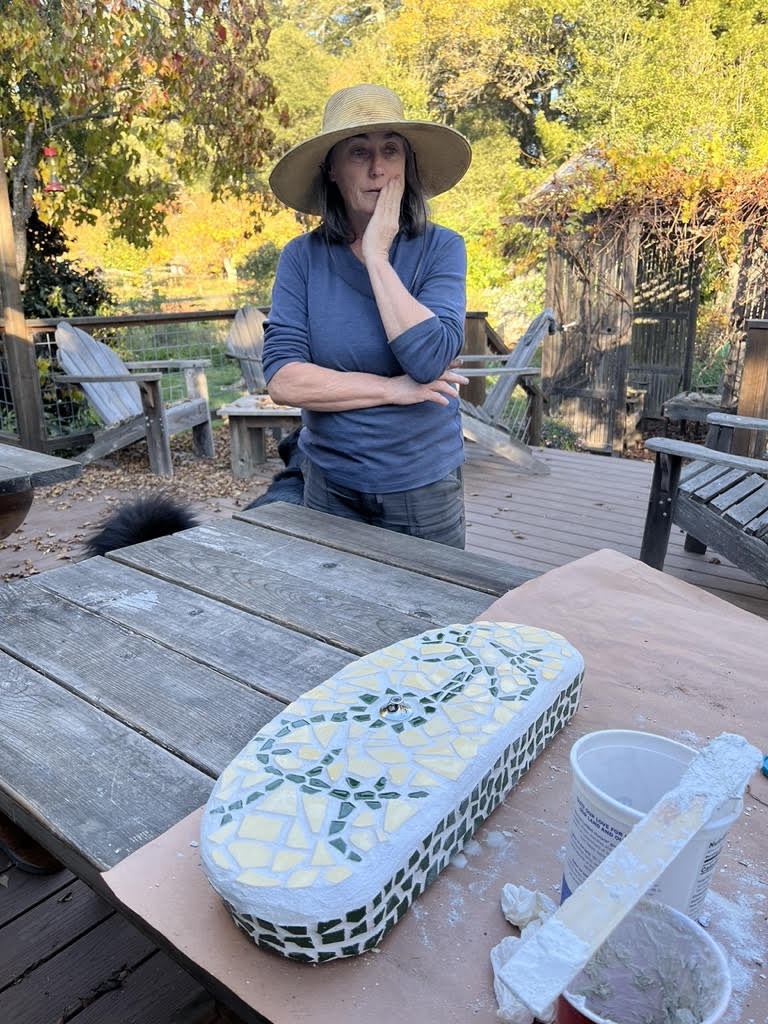 Artist Elizabeth “Liz” Newton with David Gill’s repaired and mosaic toilet tank cover. Credit: David Gill / Sebastopol Area Time Bank
Artist Elizabeth “Liz” Newton with David Gill’s repaired and mosaic toilet tank cover. Credit: David Gill / Sebastopol Area Time Bank
While the core principles are simple, both Wyatt and Gill acknowledge that implementing and managing the time bank well is a complex task. They both spent countless hours trying out different software programs before settling on a program that works well for them.
Wyatt dreams of connecting the various time banks internationally so that someone in, say, San Francisco, could learn French with a time bank member in Paris. Or a tourist traveling in Japan could meet local time bank members there and, after her return, show other tourists around her own town.
Interpreted this way, the time credit functions as an alternative currency. Members can also donate their services to community members in need and the community without banking a credit for themselves.
For instance, in Sebastopol, artist Ellie Kilner completed a giant sculpture at the Sebastopol Senior Arts Center and other art projects with the support of fellow time bank members.


Become a sustaining member today!
Join the Reasons to be Cheerful community by supporting our nonprofit publication and giving what you can.
Gill’s favorite exchange, so far, also has to do with art and with a broken toilet cover. Because the toilet was an ancient model, it was impossible to find a replacement. He posted a request for help on the time bank’s online platform, and a local mosaic artist not only glued the broken pieces together but turned it into a colorful piece of art. “Now it’s a conversation piece!” Gill raves. He says he plans to request more work from this artist, Elizabeth Newton.
He is clearly passionate about his role in facilitating the time bank and everything that time banks can provide: “I don’t think we can ever have too many friends or too much community.”
The post Banking the Most Valuable Currency: Time appeared first on Reasons to be Cheerful.
The social contract and The Voice
Now that the dust has begun to settle, we can look at the referendum result with a little more clarity. Those of us who supported the Voice saw with some dismay how the initial widespread support in favour of a yes vote began to wither away. yet we should not be fooled by the headlines Continue reading »
We’re all responsible for preventing domestic violence – and men play a crucial role
One of the most memorable tales from Tony Birch’s 2006 debut collection, Shadowboxing, is The Butcher’s Wife. In this short story, the titular wife sensationally murders and dismembers her husband after he beats her in full view of everyone in the street. The physical distress of regular beatings is almost to be taken for granted in Continue reading »
A Community-Driven Path to Replenishing Groundwater in a Parched Region
A lone tractor trundles along a bumpy road in Banda, one of the most drought-prone districts in the North Indian state of Uttar Pradesh. Up until a few years ago, soil here would dry and crack into fissures deep enough for unwary cows to fall in. Today, as we drive toward a little village called Jakhni, we see rice paddies usually found only in much wetter climes. A large pond comes into view, and behind it, Jakhni.
Thanks to a revival of old farming practices and growing community involvement in all matters relating to water, this village is now known in India as a model jalgram, or water village.
Jakhni is a settlement of barely 1,600 people, mostly farmers. Its stony, hilly terrain is typical of Bundelkhand, an arid region spread across parts of the neighboring states of Madhya Pradesh and Uttar Pradesh. This region receives between 800 and 1,300 millimeters of rainfall annually, but locals quip that like their children, who all tend to migrate for better opportunities, the rainwater runs off too. The rocks that lie beneath the region are not very porous, and there are relatively few aquifers (layers of underground water). As a result, most of the rainwater flows away from the region instead of being locally absorbed.
“Growing up, the water scarcity we experienced in Jakhni was scary,” Uma Shankar Pandey, a 52-year-old resident of Jakhni, recounts.
The post A Community-Driven Path to Replenishing Groundwater in a Parched Region appeared first on Reasons to be Cheerful.
Deception: Radicalised groups are infiltrating Australian democracy in your town
West Australia’s council elections seem a strange place to pinpoint a warning about American radicalising political games infiltrating the Australian landscape. While it is strange, it is nonetheless important. American conservative and commentator Andrew Breitbart declared a (contested) doctrine that “politics is downstream from culture.” According to his institutional heir, Steve Bannon, this means strategists Continue reading »
Come for the Free Meals, Stay for the Company
Brandon, Jackie and Julie meet for dinner every Thursday, sitting at their regular table, and often going out afterwards to a pub quiz nearby. They talk about possible quiz topics and whether they can beat their previous performance, as they dine on a freshly prepared three course meal. Servers in black aprons swiftly bring them warm bowls of freshly made butternut squash soup, hearty vegetable cottage pie, and apple crumble covered in steaming custard, a perfect antidote to a cold evening.
As they leave, there’s no check to pay for this generous meal. The pop-up cafe at a church hall in Chelmsford, England is one of 80 held across the country throughout the week. They’re an initiative of FoodCycle, the UK’s largest community dining organization, which turns produce that supermarkets would otherwise throw out into a free meal for anyone who wants to attend. In 2022, FoodCycle’s pop-up cafes served nearly 500,000 meals to 62 communities across the UK, saving 209 tonnes of food from going to waste.
It might be a small dent in the 9.5 million tonnes of food waste the UK as a whole throws out each year, but FoodCycle’s impact is much bigger than this. Forty-three percent of people who attend FoodCycle meals, like Jackie and Julie, live on their own, with 68 percent of them feeling lonely, according to a survey of 910 FoodCycle guests in 2022. Loneliness is considered to be a significant mental and public health issue in the country, affecting over half the population, with the Mental Health Foundation linking it to depression and declining physical health.
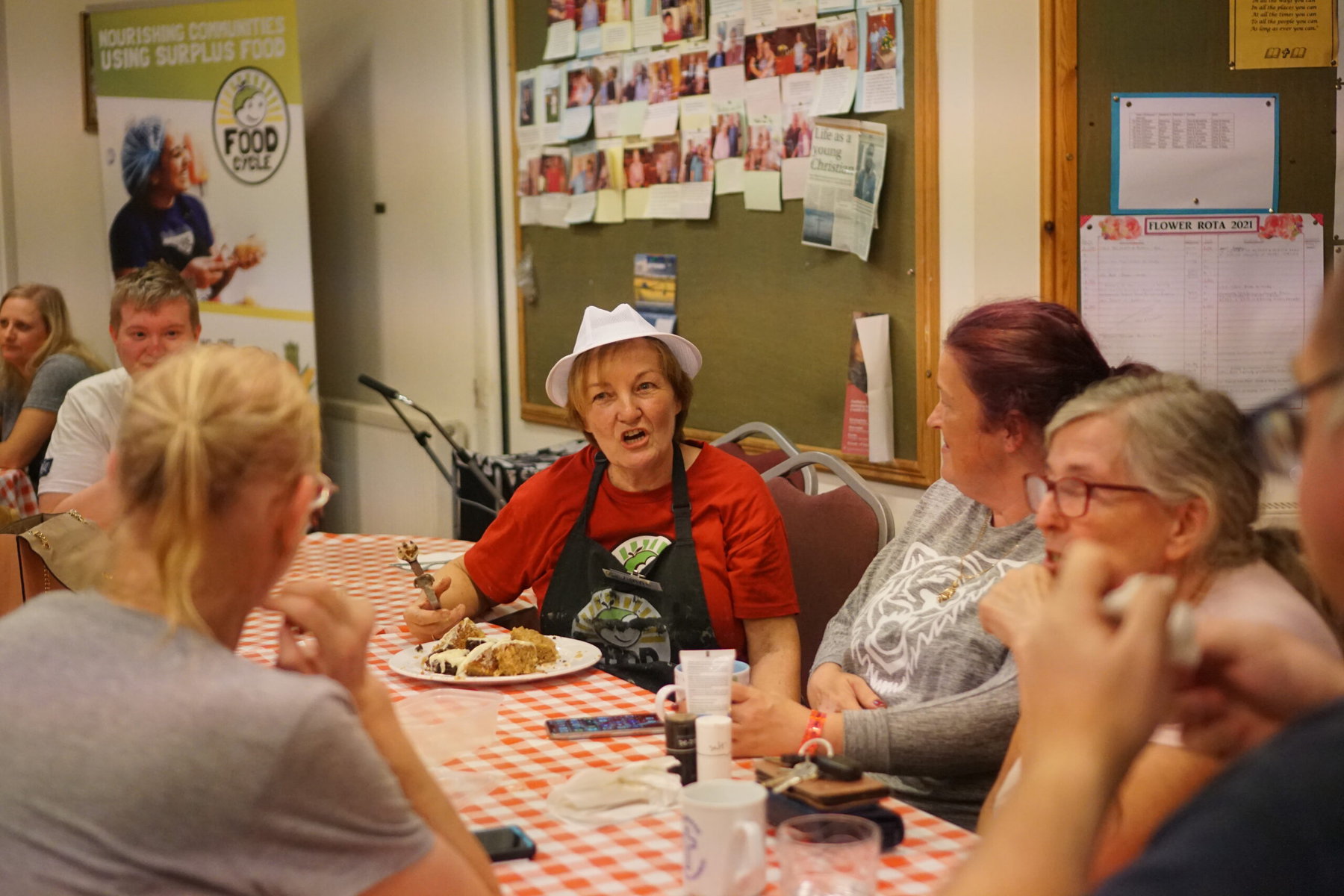 “Being able to sit in a warm and very friendly environment, whilst having hot drinks and amazing food is wonderful,” one attendee told FoodCycle. Credit: FoodCycle
“Being able to sit in a warm and very friendly environment, whilst having hot drinks and amazing food is wonderful,” one attendee told FoodCycle. Credit: FoodCycle
Food poverty is FoodCycle’s third reason for being. Around 4.7 million people in the UK, or seven percent of the population, are considered to be in food poverty — defined by the government as not being able to secure “an adequate quality or sufficient quantity of food in socially acceptable ways.” Sixty-eight percent of FoodCycle guests worry about affording food, and 92 percent are concerned about the increasing price of food, to the extent that 75 percent regularly skip meals.
“These issues are intertwined and interlinked. We know there’s a correlation between people who are facing food poverty, and feeling isolated and disconnected from their communities,” says Sophie Tebbetts, FoodCycle’s head of programs and incoming CEO from January 2024.
Crushed by negative news?
Sign up for the Reasons to be Cheerful newsletter.
[contact-form-7]
And the need, Tebbetts says, is only growing: “We’ve really seen over the last couple of years in particular the cost of living impacting our guests — we have just reached over 100,000 community meals so far this year, and we’re definitely seeing guest numbers rising across our locations and the need becoming larger.”
As a result, FoodCycle plans to expand to 100 weekly community meals in the next year, and is on a drive to boost its 6,000-strong volunteer base of cooks and servers. Some of its most well-attended meals serve up to 80 guests, making it a challenge each week for volunteers to devise a nutritious, tasty, well-rounded meal from donated supermarket produce that they will only get their hands on three hours before dinner service begins.
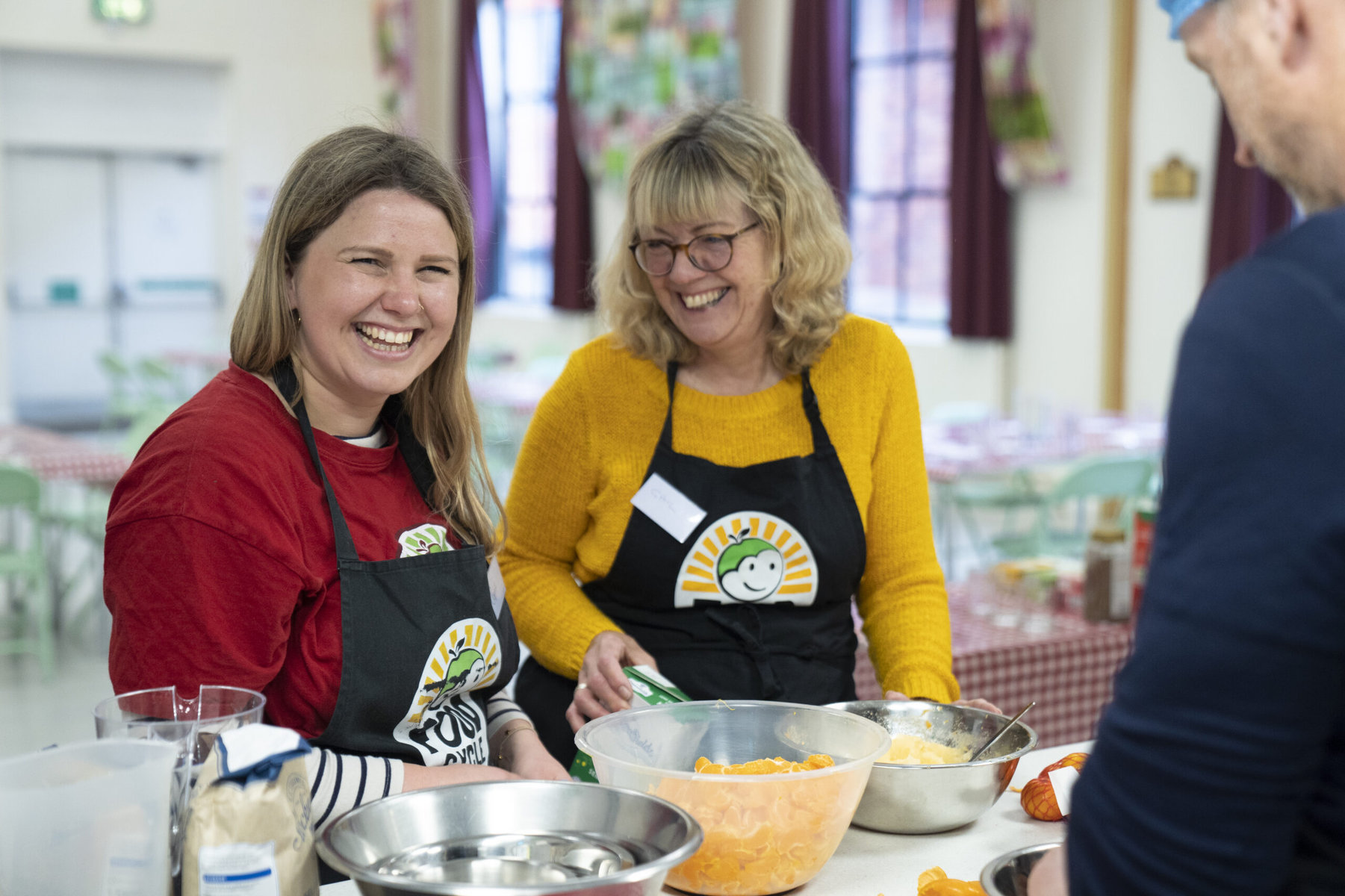 Sophie Tebbetts and a volunteer preparing custard. Credit: FoodCycle
Sophie Tebbetts and a volunteer preparing custard. Credit: FoodCycle
For many families that attend, it’s their weekly meal out as they can’t afford to go to a restaurant. During the school vacation period, it’s a lifeline for those whose children would otherwise have their single hot meal of the day at school under the government’s Free School Meals program. “It’s amazing how it is 2023 and we have that stark situation for so many people,” says Tebbetts.
The majority of FoodCycle’s weekly community meals are open to anyone, a factor which Tebbetts believes is more important than it might seem.
“Life is difficult for a lot of people. There’s a lot of stuff going on. What we want to do is create safe, warm, welcoming spaces where people can just come and connect with each other. They don’t have to prove they are in need of a free meal,” she says. “If you are struggling and are feeling isolated financially, or with your mental health, there are a lot of things you have to prove in terms of accessing help. We want to remove all of that.”
There are, however, three FoodCycle locations that have been designed for specific demographics and are open only to those groups. In Acton, West London, and Dalston, East London, weekly meals run exclusively for refugee mothers and their children, while in Stepney Green, East London, a meal is held for people living with HIV.
“Often when refugees are housed, they don’t have space for tables to sit down and eat at. So to create spaces where they can sit with others and share a meal is really important,” says Tebbetts.
Nutrition, Tebbetts notes, is really important for the health of those living with HIV: “Around 40 percent of our guests have long-term health conditions, so their diet is key to maintaining a healthy lifestyle. We also know that if you’re on a low income, you actually can’t afford to purchase what the government recommends as a nutritious meal in its Eat Well guide. We pack our meals full of fresh fruit and veggies to help up their nutritional intake during the week.”
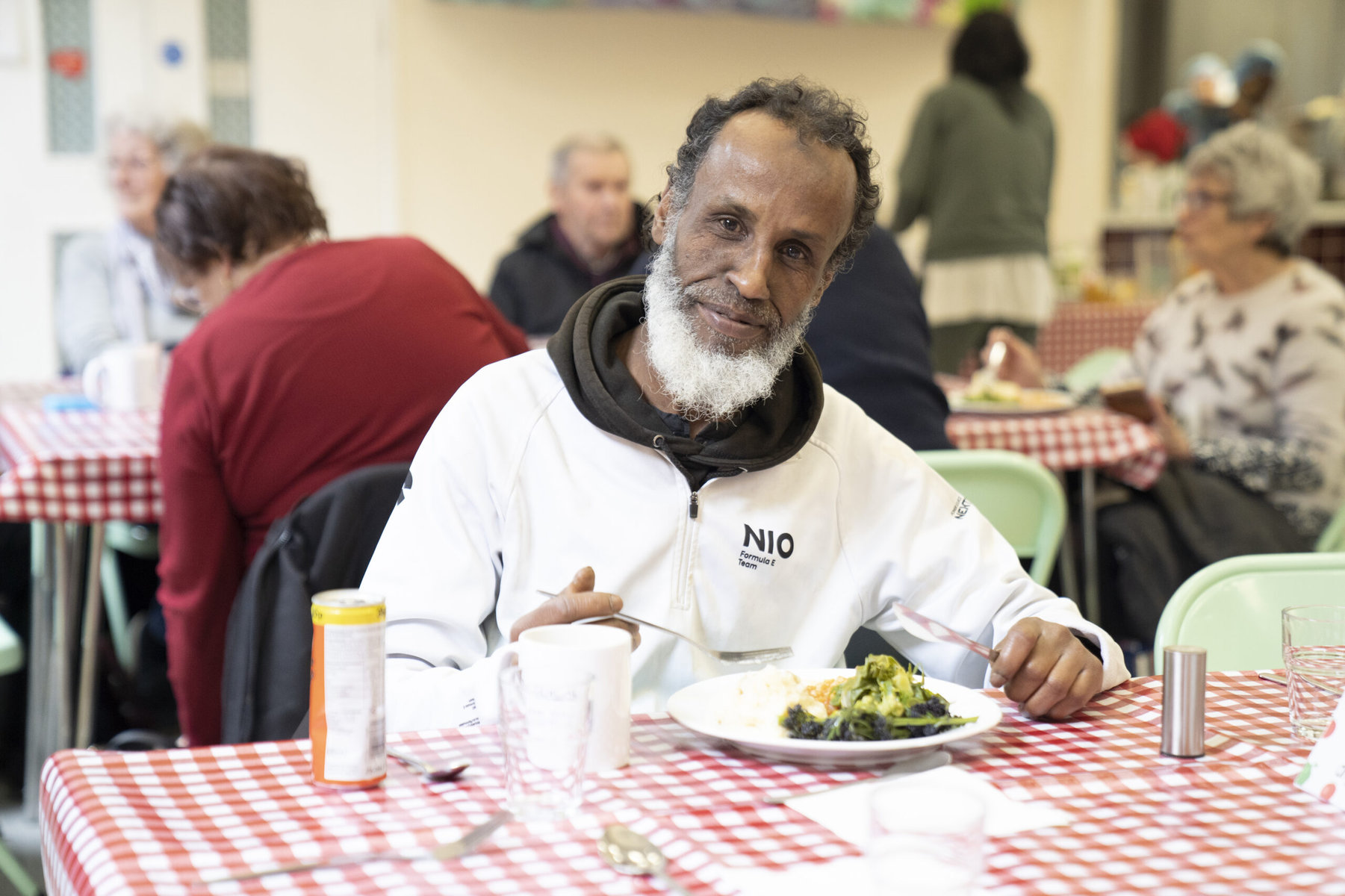 FoodCycle makes sure to pack its meals with fruits and vegetables. Credit: FoodCycle
FoodCycle makes sure to pack its meals with fruits and vegetables. Credit: FoodCycle
How the rising cost of living is impacting FoodCycle itself is not lost on Tebbetts. Venues — typically church halls or community centers, as they are most likely to have the space and kitchen facilities — are facing their own financial pressures and are becoming more reluctant to offer their spaces for free. For supermarkets, of course, it’s a no-brainer to donate produce that would otherwise be wasted, but FoodCycle still needs to purchase ingredients like herbs, spices, eggs, cheese and pasta to stock its “pantry” to turn those donations into proper meals (all vegetarian, for health, safety and inclusivity reasons).
That’s where corporate partners come in, making up over 40 percent of the £1.8 million (around $2.2 million) in income FoodCycle generated last year to cover its operating costs. Companies like Goldman Sachs have even taken part in FoodCycle Food Invention challenges, with teams creating meals from donated produce to donate to communities in need.
The difference being made is clear. Eighty-one percent of FoodCycle guests in the 2022 survey said they felt less lonely since attending their community meal, and 90 percent said they felt well-fed. Andrew, for example, lives on his own and is unemployed, living off just £14 (around $17) a week for food. “Over and above the food side of it, I like the companionship of meeting people socially and having a chat because most weeks I don’t see anybody. From the social aspect it is very warming,” he told FoodCycle.


Become a sustaining member today!
Join the Reasons to be Cheerful community by supporting our nonprofit publication and giving what you can.
Pensioner Sylvia, meanwhile, takes three buses over an hour and a half journey to get to her local FoodCycle meal, giving her a reason to leave the house, and easing her decision to turn on her heating or buy food. And for Diane, whose rising bills have impacted her mental health, and who often struggles to get out due to mobility issues, a regular FoodCycle community meal is something to look forward to.
“Being able to sit in a warm and very friendly environment, whilst having hot drinks and amazing food is wonderful,” she told FoodCycle.
As a community dining initiative above all, Tebbetts says FoodCycle is different from other charities, which often say their ambition is to one day not exist. “Even if we solved hunger, food waste and loneliness, we still think there should be spaces where people can gather and connect,” she says.
The post Come for the Free Meals, Stay for the Company appeared first on Reasons to be Cheerful.
Veteran Poetics
Book at Lunchtime: Veteran Poetics: British Literature in the Age of Mass Warfare, 1790–2015 In this first full-length study of the war veteran in literature, Kate McLoughlin draws new critical attention to a figure central to national life. Offering fresh readings of canonical and non-canonical works, she shows how authors from William Wordsworth to J. K. Rowling have deployed veterans to explore questions that are simultaneously personal, political, and philosophical: What does a community owe to those who serve it? What can be recovered from the past? Do people stay the same over time? Are there right times of life at which to do certain things? Is there value in experience? How can wisdom be shared? Veteran Poetics features veterans who travel in time, cause havoc with their reappearances, solve murders, refuse to stop talking about the wars they have been in, and refuse to say a word about them. Through this last trait, they also prompt consideration of possible critical responses to silence.
Autonomy, Community, Destiny: Re-Imagining Disability
The second seminar in the Disability and Curriculum Diversity series at TORCH The second seminar in the Disability and Curriculum Diversity series at TORCH with Elizabeth Frood (Associate Professor of Egyptology, Oxford), Dom Hyams (Producer and Editor-in-Chief, Power100) and Marie Tidball (Research Associate in Law, Oxford) .
Professor Elizabeth Frood speaks on the way her own acquired disability has had an impact on re-framing how she does fieldwork and how this has led her to adapt the methodologies she uses as an Egyptologist. Entrepreneur, Television Presenter and Editor of Power 100, Dom Hyams speaks on the potential role of the AssistMi app and other assistive technology you work with, could have on revolutionising research, which not only makes fieldwork more accessible for disabled people but enables them as researchers to access important data which benefits academia more generally.
This event was chaired by Dr Marie Tidball.
Social mobility can be much more than just widening HE access
Mary Stuart reflects on the diverse ways in which universities can and do work with local schools and businesses to kickstart social mobility and address economic disadvantage and inequality.
The post Social mobility can be much more than just widening HE access appeared first on Wonkhe.
Graduation – the most wonderful time of the year
Here's to you, Mrs Robinson! Registrarism reflects on the ups, downs, and quirks of graduation, perhaps the only time of the year when everyone in a university is (or at least appears) happy.
The post Graduation – the most wonderful time of the year appeared first on Wonkhe.